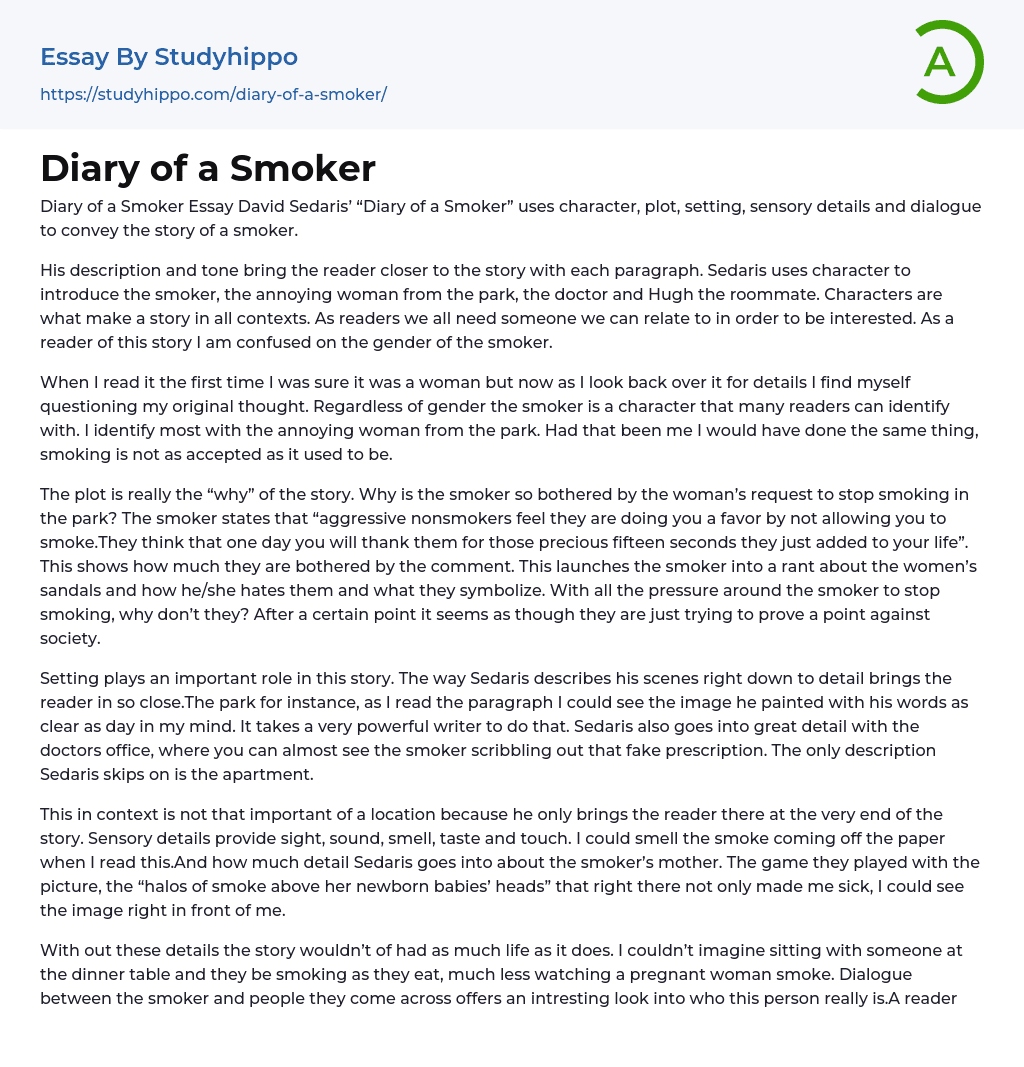Diary of a Smoker Essay David Sedaris’ “Diary of a Smoker” uses character, plot, setting, sensory details and dialogue to convey the story of a smoker.
His description and tone bring the reader closer to the story with each paragraph. Sedaris uses character to introduce the smoker, the annoying woman from the park, the doctor and Hugh the roommate. Characters are what make a story in all contexts. As readers we all need someone we can relate to in order to be interested. As a reader of this story I am confused on the gender of the smoker.
When I read it the first time I was sure it was a woman but now as I look back over it for details I find myself questioning my original thought. Regardless of gender the smoker is a character th
...at many readers can identify with. I identify most with the annoying woman from the park. Had that been me I would have done the same thing, smoking is not as accepted as it used to be.
The plot is really the “why” of the story. Why is the smoker so bothered by the woman’s request to stop smoking in the park? The smoker states that “aggressive nonsmokers feel they are doing you a favor by not allowing you to smoke.They think that one day you will thank them for those precious fifteen seconds they just added to your life”. This shows how much they are bothered by the comment. This launches the smoker into a rant about the women’s sandals and how he/she hates them and what they symbolize. With all the pressure around the smoker to stop
smoking, why don’t they? After a certain point it seems as though they are just trying to prove a point against society.
Setting plays an important role in this story. The way Sedaris describes his scenes right down to detail brings the reader in so close.The park for instance, as I read the paragraph I could see the image he painted with his words as clear as day in my mind. It takes a very powerful writer to do that. Sedaris also goes into great detail with the doctors office, where you can almost see the smoker scribbling out that fake prescription. The only description Sedaris skips on is the apartment.
This in context is not that important of a location because he only brings the reader there at the very end of the story. Sensory details provide sight, sound, smell, taste and touch. I could smell the smoke coming off the paper when I read this.And how much detail Sedaris goes into about the smoker’s mother. The game they played with the picture, the “halos of smoke above her newborn babies’ heads” that right there not only made me sick, I could see the image right in front of me.
With out these details the story wouldn’t of had as much life as it does. I couldn’t imagine sitting with someone at the dinner table and they be smoking as they eat, much less watching a pregnant woman smoke. Dialogue between the smoker and people they come across offers an intresting look into who this person really is.A reader can get so much out of dialogue that they wouldn’t be able to from just
text.
The witty banter the smoker has with the doctor brings in comic relief when the doctor starts with his standard questions. The reader can see the sarcasm jump off the page when the smoker talks about what they smoke. From the first word to the last Sedaris keeps the reader hanging on. The characters, plot, setting, sensory details and dialogue all come together as this story just waiting to capture your attention.
The fact that this story is a true diary entry of a smoker provides all the more power to the context of Sedaris’ imagination.
- Nightclub essays
- Tobacco Smoking essays
- Effects Of Smoking essays
- Christina Rossetti essays
- Emily Dickinson essays
- Ernest Hemingway essays
- Percy Bysshe Shelley essays
- Robert Browning essays
- Robert Louis Stevenson essays
- Seamus Heaney essays
- Carol ann duffy essays
- Anne Bradstreet essays
- Elizabeth Bishop essays
- Peter Skrzynecki essays
- Poets essays
- Robert Frost essays
- Aldous Huxley essays
- Anton Chekhov essays
- Charles Dickens essays
- Edgar Allan Poe essays
- F. Scott Fitzgerald essays
- Harper Lee essays
- Homer essays
- Jane Austen essays
- John Steinbeck essays
- Kurt Vonnegut essays
- Mark Twain essays
- Mary Shelley essays
- Nathaniel Hawthorne essays
- Sophocles essays
- Stephen King essays
- William Shakespeare essays
- Zora Neale Hurston essays
- Amy tan essays
- Virginia woolf essays
- Alice Walker essays
- Chinua Achebe essays
- Sherman Alexie essays
- George Orwell essays
- Sylvia Plath essays
- T. S. Eliot essays
- W. H. Auden essays
- Wilfred owen essays
- William blake essays
- Kate Chopin essays
- Oscar Wilde essays
- Phillis Wheatley essays
- Ray Bradbury essays
- Richard Rodriguez essays
- Walt Whitman essays




